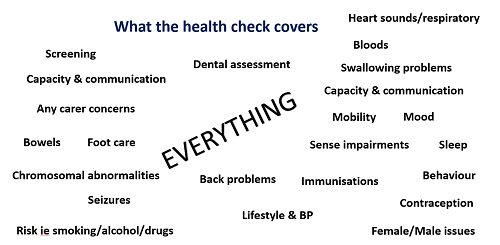Good Health
 As they move into adulthood, young people are supported to manage their own health.
As they move into adulthood, young people are supported to manage their own health.
The changing role of the parent carer or guardian
A parent carer or guardian’s role changes as children take legal responsibility for their health but many will still need help and support to do so. The Preparation for Adulthood Parent’s Guide has lots of information to help support the changes roles and responsibilities as well as wider information useful for those who have a child aged 14 years plus.
The legal rights of children, young people and adults
Get Your Rights is a new interactive website which helps to explain to children and young people their rights when using the NHS. The Citizen’s Advice Bureau also provide wide-ranging advice and support.
14 years of age
If you are aged 14 years or over, you and have a learning disability you are entitled to a free annual health check from your GP (see below for details).
16 Years of age or older
If you are aged 16+ years old and up, then you will start to access some adults’ services and take the lead in making decisions about your health.
18 years older
If you are under 18 with a learning disability, then you will still be able to access children’s services but will also have more of a say about your care. You are also entitled to an annual health check (see below).
If you are 18 + you will access adult health services.
Free annual health checks for young people aged 14+
Young people with learning disabilities can get free health checks with their GP once they reach the age of 14. Has your son or daughter had theirs? ![]()
Do take the opportunity to arrange regular checks for your young people as it may identify hidden health conditions early – and help them lead healthier, longer lives well into adulthood.
You can ask your GP for your young person to be added to their Learning Disability Register. They will then be invited for an annual Learning Disability Health Check.
Post-16, you will probably need to have third party agreement with their GP surgery to help manage their appointments and prescriptions on their behalf.
Why is it important?
People with a learning disability often have poorer physical and mental health than other people. This does not need to be the case. People with learning disabilities don’t have equal access to healthcare as the general population are they are often not able to communicate their health needs and are more susceptible to certain health conditions.
Cambridgeshire Learning Disability Partnership wants to boost the take-up of health checks. Only about one in three 14-18 year olds who are eligible have had their check and it wants to make sure that rises to three out of four (75%) by 2020.
Every GP in Cambridgeshire and Peterborough is signed up to provide them but parent carers are being asked to make sure their son or daughter is on their local GP’s Learning Disability Register.
How to claim the free health check
- Are you registered with a local GP?
- Ask the receptionist at your GP Practice to check your young person is on the register.
- If your son or daughter has not been invited by letter for a check, ask for a health check appointment. It should take between 30-60 minutes.
- You can talk to your teenager/young adult about the check and watch a YouTube video about what it will be like or go through an EasyRead guide about the appointment.
- After the appointment, your young person will receive a follow-up action plan.
- If your son or daughter lives at a different address, ask your GP to send the letter to you as well.
Even if your son or daughter goes to see your GP/Paediatrician regularly, booking a health check will help identify any other health conditions as it covers 26 different areas:

Mental Capacity

The Mental Capacity Act (MCA) is designed to protect and empower individuals who may lack the mental capacity to make their own decisions about their care and treatment.
The law applies to vulnerable people aged 16 and over – including young people with a learning disability or mental health problems. And spells out
- who can take particular decisions on someone else’s behalf
- when and how a decision can be taken
- when and how people who lack capacity to take decisions about their care and welfare can be deprived of their liberty to get the care they need in a hospital or care home.
Read more about Mental Capacity
Cambridgeshire County Council presentation to Pinpoint’s Preparing for Adulthood Group – January 2018
Preparing for Adulthood Factsheet: The Mental Capacity Act 2005 and Supported Decision Making
The Care Quality Commision website
Mencap website and Mencap MCA resource pack
Not being consulted about your young person’s welfare?
Ambitious about Autism, Mencap and the Challenging Behaviour Foundation in partnership with legal firm Irwin Mitchell, have produced a leaflet to help individuals who feel that they are not being appropriately consulted about the welfare of their loved ones.
Download the leaflet, which also includes template letters.
Useful videos on Mental Capacity Act Guidance
Hft’s Family Carer Support Service has videos on Mental Capacity on YouTube including:
- assessing capacity
- best interests
- challenging a decision
- health
- involving family carers
- managing finances
- moving home
- transition
Quick reference service directory for over those 14 years or older
Annual Health Checks for people with a learning disability
Annual health checks are for adults and young people aged 14 or over with a learning disability. You can ask your GP for your young person to be added to their Learning Disability Register. They will then be invited for an annual Learning Disability Health Check.
Attention Deficit Hyperactivity Disorder
Under 18 years, referrals are through professionals working with the child: the school, a paediatrician or GP (General Practitioner) .
For adult (18 years and older) referrals you can contact Cambridgeshire’s NHS service.
Audiology
Under 16 years will require a referral from your child’s GP, Health Visitor, School, Paediatrician or Speech Therapist.
Over 16’s will need to see their GP who can refer them to the Ear, nose and Throat clinic. High street chemists and opticians may also provide hearing services including hearing check – there us usually a charge.
Autism Spectrum Disorder and Social Communication Difficulties
Referrals for secondary school age children up to 18 years is by the GP to Children’s Mental and Adolescent Health Services. Young people over the age of 18 will be referred by their GP to adults’ mental health services.
Continence Services
Cambridgeshire has a paediatric continence service for children aged 4-19 and how to make a referral can be found here. Those over 18 will need adult services and should talk to their GP.
Dentistry
You’re entitled to free dental care if you are aged under 18, or under 19 and in qualifying full-time education or have certain exemptions.
Drugs, alcohol and substance abuse
Anyone needing help should talk to their GP who can refer to appropriate services.
Dyspraxia
Those under 16 years will be referred by their GP to the Children’s Paediatric Service. Those over 16 years old should talk to their GP.
Eating concerns
Talk with your child’s GP, Health Visitor, Paediatrician, or your GP. Young people can seek their own referral from the age of 17 or 18 through their GP.
Gender
All ages should talk with their GP, or parents should talk to their child’s or their own GP. There is NHS help available for teenagers who need support around gender.
Mental Health
Mental Health Crisis
CPFT have a First Response Service (FRS) for people of any age who are distressed, worried about their mental health or experiencing something that makes them feel unsafe. It provides 24-hour access, seven days a week, 365 days a year, to mental health care, advice and support. Find out more about the First Response Service.
For those children under the age of 17, ask the GP for a referral to Children and Adolescent Mental Health Services. If you are under 18 and have a learning disability you will either access children’s services or will need a referral from your GP. If you are 18 or older then you will need to ask your GP to refer you to Adult Services.
Occupational Therapy Service
The Children’s Occupational Therapy Service supports children between 0-18 years old, and those up to 19 years of age if attending special school provision. Over 18 year olds will need a referral from their GP to Adult Services.
Orthotics and Prosthetics Service
If the young person is under the age of 18 (or 19 for certain individuals in Specialist Education) and receiving care from the Children and Young People’s Physiotherapy Service, their physiotherapist will directly arrange for orthotics.
If the young person is 18 and above and not currently receiving services from the Children and Young People’s Physiotherapy Service, referrals should be initiated through a GP, or specialists. If you need further follow-up care or advice, please contact the appropriate Orthotics Service for support.
Physiotherapy
Children’s Physiotherapy is available to those under 18 years (or 19 years for some in Specialist Education). You can ask professionals involved with your child, such as school staff, GPs or other healthcare providers, to make a referral to the Children and Young People’s Physiotherapy services. It’s important to note that this service doesn’t accept self-referrals.
If the young person is over 18 years old you should talk to their GP to access Adult Services.
Prescriptions
Prescriptions will be free until a young person becomes 16 (or 18 if they are in full time education). If you receive Universal Credit, this is extended to 20. They will continue to receive free prescriptions as an adult if they have the following medical conditions:
- A permanent fistula (for example, a caecostomy, colostomy, laryngostomy or ileostomy) requiring continuous surgical dressing or requiring an appliance
- a form of hypoadrenalism (for example, Addison’s disease) for which specific substitution therapy is essential
- diabetes insipidus or other forms of hypopituitarism ▹ diabetes mellitus, except where treatment is by diet alone
- Hypoparathyroidism
- myasthenia gravis
- myxoedema (hypothyroidism requiring thyroid hormone replacement)
- epilepsy requiring continuous anticonvulsive therapy
- a continuing physical disability that means the person can’t go out without the help of another person
- undergoing treatment for cancer, including the effects of cancer/treatments.
Puberty
Parents and young people can investigate support from their local GP or Cambridgeshire’s NHS icash service. Our section on Sexual Health may also be useful.
Sensory Processing Differences and Difficulties
Cambridgeshire’s Children’s Occupational Therapists will see children to the age of 16 years. For older children and young adults talk to the GP.
Sensory Processing Disorder (SPD) is not included in the Diagnostic and Statistical Manual (Fifth Edition); sensory differences are considered a symptom rather than a diagnosis. The Royal College of Occupational Therapy (RCOT) do not therefore support the use of SPD as a diagnostic label.
SCIP and SCIP card – Special Needs Community Information Point and Card
SCIP (Special needs Community Information Point) is a Cambridgeshire County Council information and advice service for families with 0–25-year-olds with a disability or additional needs.
Sight
For those not already under specialist services, high street opticians offer sight tests. You’re entitled to a free NHS sight test if you: are under 16 or are 16, 17 or 18 and in full-time education. Those over 18 using specialist services will be transferred to adults services.
Sleep
Those under 18 can access the Cambridgeshire Sleep Service: Community.SupportServices@cambridgeshire.gov.uk. Those over 18 should ask their GP for advice.
Speech and Language
Those under 18 can self-refer (or their parents can seek a referral for them) to this service. Over 18’s will need to talk to their GP.
